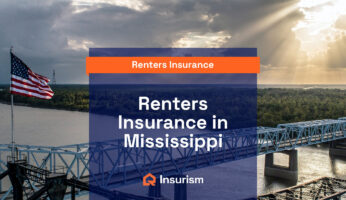Table of Contents
- What is personal liability coverage in renters insurance?
- How does renters insurance liability coverage work?
- Can landlords require renters to purchase personal liability coverage?
- How much personal liability coverage do I need?
- How much does personal liability coverage cost?
- What isn’t covered by personal liability coverage?
- How to get complete liability coverage with an umbrella policy
What is personal liability coverage in renters insurance?
In renters insurance, your personal liability coverage is the part of your policy that protects you from legal expenses. It covers you if someone seeks compensation from you for property damage or bodily injury — in other words, if they take you to court claiming that you hurt them or damaged their things.
Most renters insurance policies do not provide liability coverage against other types of lawsuits, such as defamation lawsuits (someone suing you for libel or slander). We discuss how to protect yourself against these lawsuits in more detail later.
How does renters insurance liability coverage work?
If somebody sues you for bodily injury or property damage, your renters insurance provider will investigate the matter. If they decide that you weren’t at fault, they’ll send the person suing you a “denial letter,” which is exactly what it sounds like — a document denying that you were responsible.
You won’t need to go to court unless the other side chooses to fight the denial letter and press on with their lawsuit. If they do, your insurer will hire an attorney of their choice to represent you, and may take an active role in planning your legal defense.
If you lose the lawsuit or settle, your insurer will pay for your expenses, including any damages the victim is awarded (which might include the cost of their damaged property, their medical bills, and potentially compensation for their pain and suffering).
Where does my personal liability coverage protect me?
Crucially, your renters liability insurance protects you everywhere. The accident that you’re being sued over does not need to have occurred in your residence.
For example, if someone sues you for knocking them down the stairs at a shopping mall, or if your dog bites somebody at the dog park, your insurer will cover you even though neither incident occurred in or near your residence.
How much of my liability will my renters insurance company cover?
Your renters insurance provider will cover your legal expenses up to a fixed amount, called your coverage limit. You pick this amount when you take out your policy.
The “standard” coverage limit is $100,000, and that’s what your insurer will default to if you don’t specify otherwise. This is enough liability insurance for most people, but there are some circumstances in which you’ll want more — we talk about this further down in the article.
How is personal liability coverage different from guest medical coverage?
Confusingly, renters insurance features another type of coverage known as guest medical coverage or goodwill coverage, which also pays for other people’s medical bills. Renters insurance websites often conflate the two, but they’re different.
Guest medical coverage pays for small injuries caused in your home. It covers your guests’ medical bills up to a relatively small amount (generally somewhere between $1,000 and $10,000) and unlike liability coverage, it kicks in regardless of whether you’re at fault.
Personal liability coverage is different from guest medical coverage because it:
- Pays for accidents no matter where they happen — whereas guest medical coverage is specific to your home.
- Pays for all sorts of legal expenses, not just medical bills.
- Potentially covers much larger amounts (usually up to at least $100,000).
- Only kicks in when you’re legally responsible for what happened, or when the victim is attempting to hold you responsible.
Can landlords require renters to purchase personal liability coverage?
Yes, your landlord can require you to get a certain amount of personal liability coverage when you buy renters insurance.
Unless you live in Oklahoma, your landlord can require you to get a renters insurance policy. Generally speaking, if your landlord does require one, they’ll care more about your liability coverage than your personal property coverage. That’s because your personal property is largely your business, whereas your liability coverage has the potential to affect other tenants (e.g. if you get into a legal dispute with them).
This means that your landlord might specify a minimum amount of liability coverage that your policy has to provide.
To verify that you bought the required amount, your landlord might also ask you to add them as an interested party on your renters insurance policy. This doesn’t provide coverage for them; it just means that they can view your policy and your insurer will let them know if you cancel it or make any changes to it.
How much personal liability coverage do I need?
Most people only need the “standard” amount of personal liability coverage, which is $100,000.
However, depending on your circumstances, it might be worth increasing this to a higher limit, such as $300,000, $500,000, or even $1,000,000. (You usually can’t decrease it below $100,000, and even if your insurer would let you, that wouldn’t be a good idea — any less and you’d be dangerously unprotected against legal expenses.)
When should I consider increasing my personal liability coverage?
You should consider asking for a higher coverage amount if any of the following apply to you:
- You’re a high-net-worth individual with a lot of assets
- You have dangerous pets (especially dogs)
- Your home has potentially dangerous amenities (like a swimming pool)
- You regularly host large gatherings with alcohol
Let’s look at those in more detail.
If you have a high net worth
Insurance experts often recommend that you buy an amount of liability coverage that equals or exceeds the value of all of your assets. Your assets include your personal property, your car, the money in your bank account, and so on.
As a tenant, your assets might total $100,000 or less — many people don’t reach six figures until they purchase their first house or condo. However, if you’re relatively wealthy despite not owning your current home, you should consider buying more liability coverage.
Note that this doesn’t absolutely guarantee you won’t lose your assets in a lawsuit — no matter how much insurance you have, it’s always possible the victim will be awarded damages that exceed your limit. However, as a general rule, the more you have to lose, the more coverage you should have.
If you have a dog that might bite people
Dog bites are among the most common reasons for personal liability claims, and medical expenses for serious dog bites can go beyond $100,000. If you have a large dog, consider buying additional liability coverage to fully cover dog bites.
If you have a swimming pool, a trampoline, or a treehouse
In some states, home swimming pools and other facilities are considered to be “attractive nuisances.” In plain English, this means that if a child wanders into your residence and is injured while playing in your pool, trampoline, or treehouse, you might be liable.
The risk of an injury increases if you don’t have proper safety precautions in place (e.g., a locked gate to prevent access to your yard which contains your pool or trampoline).
If you have any amenities that might present a danger to unsupervised children, you should consider buying more liability coverage. It’s also important to let your insurer know that your residence features these amenities. If you have to file a claim related to the amenity in question, you don’t want your insurer to think that you withheld information from them, as that could cause them to deny your claim and drop your policy.
If you frequently have people over
If you often have guests or workers in your rental unit, the risk of someone getting injured and making a liability claim against you increases.
Your risk is particularly high if you regularly host events where people drink alcohol, so if you like to throw parties, consider getting more liability coverage.
How much does personal liability coverage cost?
Your personal liability coverage is included in the overall cost of your renters insurance policy.
On average, the price of renters insurance is around $15–$20 per month, which includes the standard $100,000 in liability coverage.
Increasing your liability coverage will also increase your renters insurance premiums, but not by very much — adding an additional $100,000 in coverage will usually increase them by less than $1 per month.
Personal liability coverage doesn’t come with a deductible
Note that when you file a personal liability claim under your renters insurance policy, you don’t have to pay a renters insurance deductible. In other words, unless a claim against you exceeds your coverage limit, you don’t have to pay anything out of your own pocket.
What isn’t covered by personal liability coverage?
Your renters insurance will not cover liability claims of the following nature:
Intentional damage or injury
If you intentionally cause damage or injury, your provider won’t cover it. If you get into an argument with your neighbor and intentionally hurl a flowerpot through their window, you’ll have to deal with the consequences on your own.
Criminal prosecution or proceedings
Similarly, renters insurance only covers your civil liability, not your criminal liability.
As we’ve established, if you accidentally hurt someone and they sue you in civil court, your provider will cover your expenses. However, if you’re charged with a crime — for example, if a prosecutor feels your actions were so egregious that they constituted criminal negligence — you’re responsible for securing your own legal counsel.
Defamation lawsuits
As mentioned, renters insurance liability coverage mainly protects you from lawsuits related to physical damage, i.e. property damage or bodily injury.
If somebody sues you for slander or libel, your provider won’t cover your legal expenses. You can protect yourself against defamation lawsuits with an umbrella insurance policy (discussed below) or a type of renters insurance rider called a personal injury rider.
Car-related liability
If you hit someone with your car or damage their property (e.g. by plowing into their mailbox), your renters insurance won’t cover it. That’s what your auto insurance is for, and insurance companies generally try to avoid writing policies with overlapping coverage.
Business liability
If you operate a business out of your rental unit, your renters insurance won’t cover any legal expenses related to your business activities. If a client sues you or if a courier slips and falls while delivering a heavy piece of business equipment, you’ll need to file a claim through a different type of insurance, such as in-home business insurance.
Your own injuries
Hopefully it goes without saying, but your personal liability coverage is for injuries (and property damage) done to other people. If you accidentally hurt yourself, you can’t use your own renters insurance policy to pay your own medical bills — you need to use your health insurance for that.
How to get complete liability coverage with an umbrella policy
As stated, if a liability claim is above your coverage limit, you are responsible for paying any additional expenses — unless you have an umbrella insurance policy. This is a type of policy that adds further liability protection to whatever your normal policy offers.
Umbrella coverage generally provides at least $1 million in liability coverage, and potentially up to $5 or $10 million (depending on your insurer). Basic policies cost around $200–$300 per year, although the more coverage you buy, the more expensive your policy will be.
Umbrella insurance covers some types of liability claims that renters insurance doesn’t. For example, most umbrella insurance covers lawsuits brought against you for:
- Slander
- Libel
- False imprisonment
- Invasion of privacy
- Wrongful entry
- Malicious prosecution
Admittedly, for most of us, the odds of being sued for most of these are fairly small. However, your odds of being sued for something like false imprisonment are higher if your job actually requires you to detain people on occasion — if you’re a security guard, for example.
Slander and libel lawsuits are also fairly common. Some litigious businesses are even in the habit of suing people for writing negative online reviews. If you tend to be fairly outspoken, having insurance to cover your defamation liability can do a lot for your peace of mind.
Importantly, your personal liability from intentional damage and business-related situations isn’t covered by most umbrella policies. Always check with your provider to make sure you understand what your various insurance policies cover.
Related Questions
- What is guest medical coverage in renters insurance?
- What is a sub-limit in renters insurance?
- Does renters insurance cover home-based businesses?
- Does renters insurance cover gold or silver bullion?
- What does "dependent in the care of" mean in renters insurance?
- Does State Farm renters insurance cover hotel stays?






